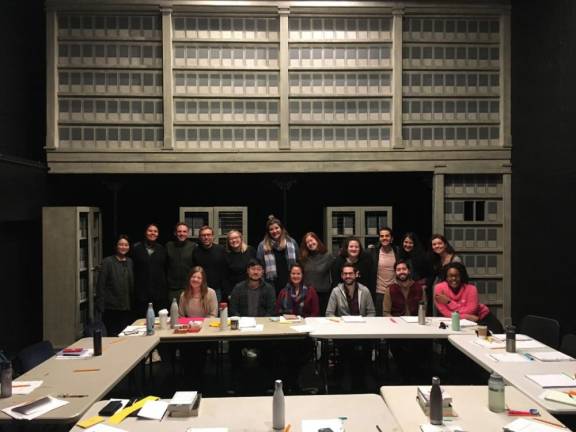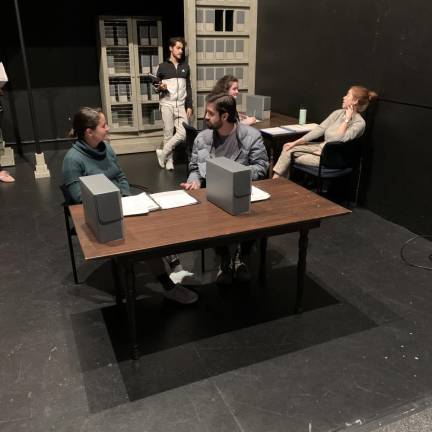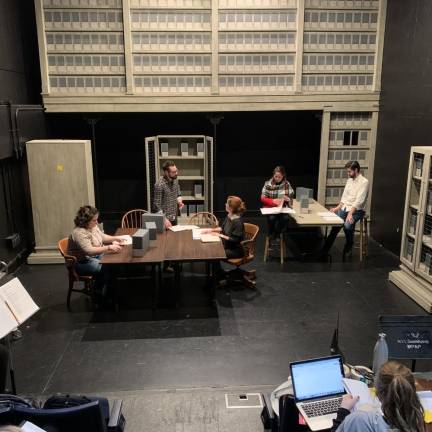Joe Salvatore is no Broadway baby. As a writer, director, and professor of educational theater at NYU Steinhardt, Salvatore has spent the past 25 years moving and challenging audiences with his thought-provoking works of theater. An off-Broadway Alliance Award nominee, Salvatore and his work has been featured in many important new outlets, such as The New York Times, The Guardian, NPR, and The Hollywood Reporter.
His latest endeavor is "Making Gay History: Before Stonewall," a stage adaptation of Eric Marcus's podcast of the same name. The play presents portrayals of pre-Stonewall figures who helped advance the LGBT civil rights movement with their bold activism. The show's main purpose is to educate audience members about important pre-Stonewall LGBT activists who they may have not previously known about. We sat down with Salvatore last week to talk about intersectionality, documentary theater and the current political climate.
How did the idea for this project come about?
Eric [Marcus] conducted these interviews with LGBTQ+ activists/allies in the late '80s. First they became a book called "Making History" in 1992. Then, he re-published them again as oral histories in 2002 under the title "Making Gay History" with some rearranging. And then he donated the archive to the New York Public Library, thinking that he was finished.
Then, in 2015, he was approached about turning it into a podcast series. And so they did that. It's in its sixth season. It's available online. It's had three million downloads. It's very popular. His advisory board started to talk about, "How could this become a piece of theater?" "The Laramie Project" is one of the most produced plays in high schools and colleges and universities around the country. And there was this idea that, "How could a play be created from this material that could be produced by high school students and colleges to help teach LGBTQ history?"
Eric and I sat down for coffee two years ago, and decided that it would make sense to have a collaboration about turning this podcast into a play.
Politics and the LGBT experience are inevitably intertwined. How has the current political situation in the United States influenced the production of this piece?
For a long time, there has been this notion of intersectionality and marginalized voices. And that primarily the narratives around LGBTQ+ history are often white men, sometimes white women, and where are the people of color, and where are the transgender individuals? Part of our goal in this project was to bring those voices that are in Eric's archive forward. So that's one thing, about representation. And for me, that's political.
Also, the Supreme Court has just heard a case about gay people being able to be fired from their jobs. If an employer decides they want to fire an LGBTQ person, the Supreme Court is going to issue a decision in June about whether that's legal or not. One of the people in the play is Frank Kameny, who was fired by the federal government for being a homosexual in the 1950s. And so that is very present for me. That narrative must be in this play, so people don't think that just because we have a gay man who's an openly gay man running for president, or because we have marriage equality, that the work is done.
How have rehearsals been? What challenges have you faced in the rehearsal process?
The company is fantastic. The actors are great, and the creative team/the designers are great. It's a lot of moving parts. I've been very aware of my own position as a white cis male, making a work that is trying to present as many voices as possible in a really short period of time. I think ninety minutes is about the right length for an audience. So we're trying to hover between ninety and a hundred minutes. There are more people who have not been included in the play than there are people who are included in the play. And so the weight of those decisions has weighed heavily on me.
And I've found it hard, because I tried to be aware of my positionality through the process, and kind of checked for my blind spots as we've gone through. But ultimately I have to make decisions to get the play to go.
In this play, you have white, cisgendered actors sometimes playing different genders and characters of color. Is it appropriate for an actor to play a role outside of her gender/ethnicity?
This is the question. I think the sweet spot is that no one is ever allowed to do a caricature. I don't let anyone do a caricature. Every actor in the company is playing against type at least once, in some way. And that might be gender, that might be gender identity, that might be race and ethnicity. So if I am the actor, and I am about to take on a character that is very different than me, I may begin speaking as the character, and these glasses [that I'm wearing] are "my character," and as I begin speaking, you see me "go in." And then as I finish, you see me [take off the glasses]. So it's not like I go off stage and put my glasses on, and then I'm this person. There's a conscious presentation of character. The audience is never meant to suspend their disbelief. The actor never goes away, so we know that the actor is playing a character.
My job, and the vocal coach's job, and the assistant director's job, is to pay really close attention to how the actors are playing it, so it stays in that sweet spot at all times.
So it's different in that respect from a biopic. Like in "Milk," when Sean Penn becomes Harvey Milk in the biopic. The actors are very clearly presenting what they've discovered from this investigation. I'm not asking anyone to become this person; they're presenting what they've found.
What do you hope people will take away from this performance after seeing it?
I want an audience to experience this play, and leave the room wanting to investigate more of these people. Wanting them to say, "well I don't know who Frank Kameny is, and he sounds like he did something pretty amazing, so I'm going to listen to the podcast to learn more." Because the podcasts are like twenty to twenty-five minutes each. At most, a person gets six minutes in this play. There's a lot more for people to know.
I want people to understand that Stonewall happened, and obviously a lot of people were involved in Stonewall (Marsha P. Johnson and Sylvia Rivera are two names that we know), and their contributions are incredibly important. There are also people who came before them, and their contributions are really important.
The play for me is a catalyst for further investigation. It's not an all-encompassing, like "this is LGBTQ+ history." It could never be. It's a snap shot, or a series of snapshots, of people that made important contributions. And the goal is that the audience leaves, and does more investigation beyond that.
"Making Gay History: Before Stonewall" will run from February 28th-March 8th at the Provincetown Playhouse. Tickets are available for purchase at: https://tickets.nyu.edu/events.
This interview has been edited and condensed.


